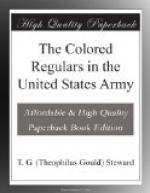The 24th Infantry was ordered down to Siboney to do guard duty. When the regiment reached the yellow-fever hospital it was found to be in a deplorable condition. Men were dying there every hour for the lack of proper nursing. Major Markley, who had commanded the regiment since July 1st, when Colonel Liscum was wounded, drew his regiment up in line, and Dr. La Garde, in charge of the hospital, explained the needs of the suffering, at the same time clearly setting forth the danger to men who were not immune, of nursing and attending yellow-fever patients. Major Markley then said that any man who wished to volunteer to nurse in the yellow-fever hospital could step forward. The whole regiment stepped forward. Sixty men were selected from the volunteers to nurse, and within forty-eight hours forty-two of these brave fellows were down seriously ill with yellow or pernicious malarial fever. Again the regiment was drawn up in line, and again Major Markley said that nurses were needed, and that any man who wished to do so could volunteer. After the object lesson which the men had received in the last few days of the danger from contagion to which they would be exposed, it was now unnecessary for Dr. La Garde to again warn the brave blacks of the terrible contagion. When the request for volunteers to replace those who had already fallen in the performance of their dangerous and perfectly optional duty was made again, the regiment stepped forward as one man. When sent down from the trenches the regiment consisted of eight companies, averaging about forty men each. Of the officers and men who remained on duty the forty days spent in Siboney, only twenty-four escaped without serious illness, and of this handful not a few succumbed to fevers on the voyage home and after their arrival at Montauk.
As a result, thirty-six died and about forty were discharged from the regiment owing to disabilities resulting from sickness which began in the yellow-fever hospital.—Bonsal’s Fight for Santiago.
FOOTNOTES:
[20] “After the surrender, dear Chaplain, the real trouble and difficulties began. Such a period, from July 14, 1898 to August 14, 1898, was never before known to human beings, I hope. The starving time was nothing to the fever time, where scores died per day. We were not permitted to starve; but had fever, and had it bad; semi-decayed beef, both from refrigerators and from cans. We had plenty of fever, but no clothing until very late; no medicine save a little quinine which was forced into you all the time, intermittent only with bad meat.”—Extract from a soldier’s letter.
[21] While the Twenty-fifth Infantry was in camp at Chickamauga Park I was ordered to Xenia, Ohio, on recruiting duty, and on July 5. on seeing the reports of the wounded I asked officially to be ordered to my regiment. An order to that effect came about a month later, directing me to join my regiment by way of Tampa, Florida. Arriving in Tampa, my destination was changed by telegraph to Montauk Point, N.Y., whither I arrived a few days before the regiment did.




